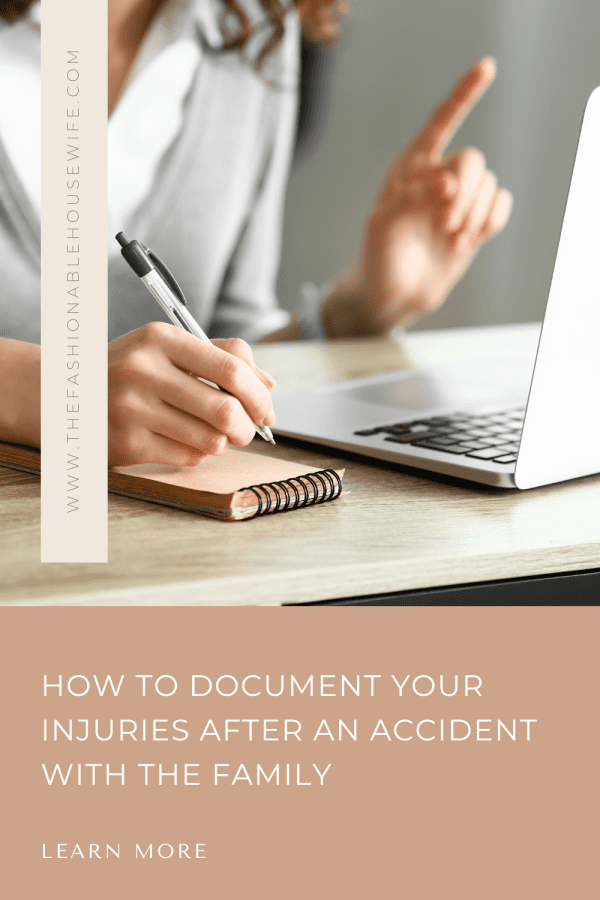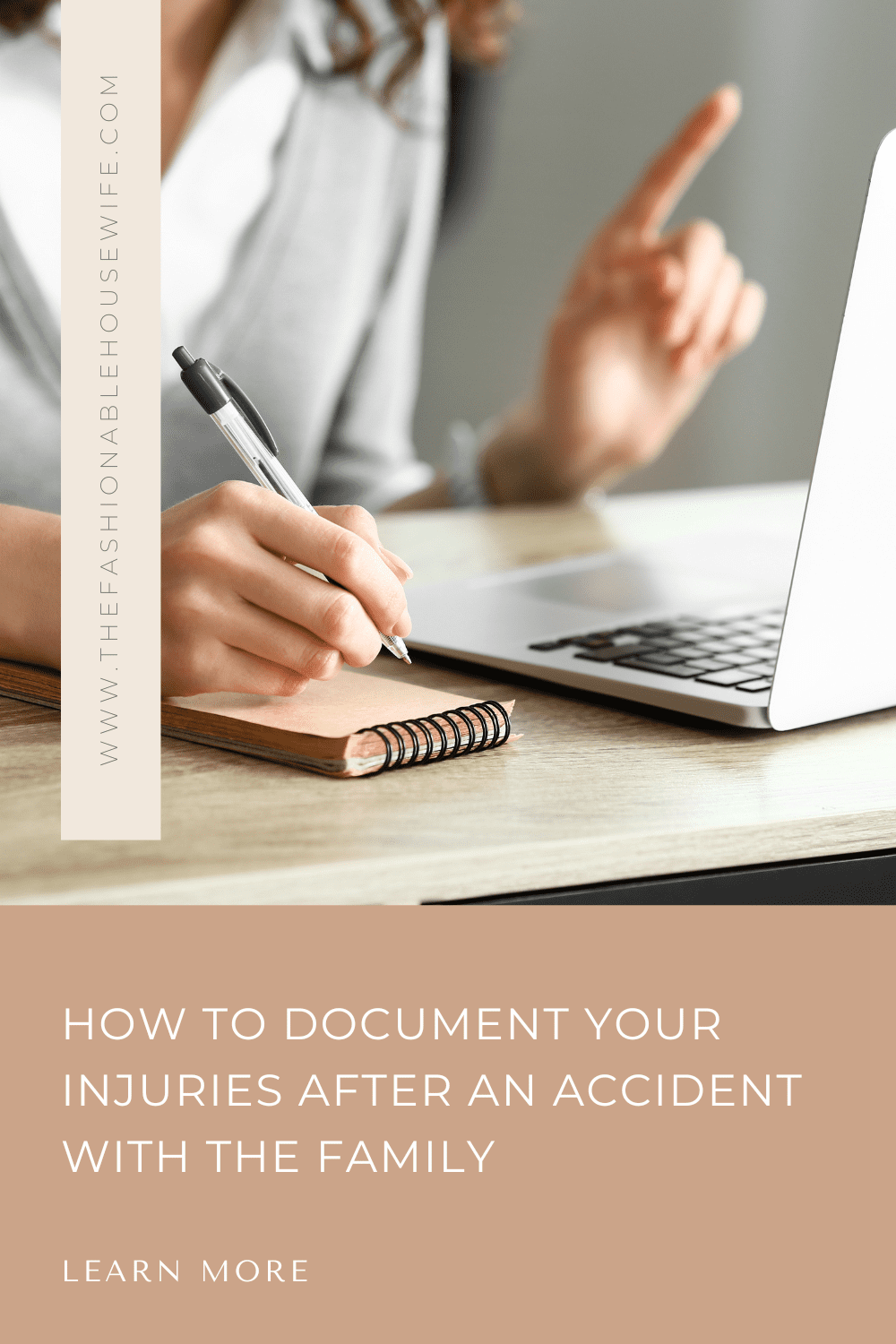How To Document Your Injuries After An Accident With The Family

Accidents involving family members are stressful and emotionally charged situations. Beyond the immediate concern for everyone’s well-being, legal considerations can arise later, especially if injuries were sustained. Whether it’s a car accident, a slip and fall incident at a family gathering, or even a mishap during a recreational activity, proper documentation of injuries is crucial. This evidence can be essential for securing medical treatment, pursuing insurance claims, or even legal action if necessary.
This guide outlines the importance of documenting injuries after an accident involving family and provides practical steps on how to gather comprehensive evidence. By being proactive and detailed, you can help ensure everyone receives the support they need during this challenging time.
Why Document Your Injuries After a Family Accident?
While tending to your loved ones is the primary concern right after an accident, documenting injuries is equally important for several reasons:
- Accurate Medical Treatment: Detailed documentation helps healthcare providers understand the extent and nature of your injuries. This allows them to provide the most appropriate diagnosis and treatment plan, potentially leading to faster recovery and better long-term outcomes.
- Insurance Claims: Whether you file a claim with your own insurance company or a third-party’s, thorough documentation strengthens your case. Medical records, photographs, and witness statements can be vital in demonstrating the cause and severity of your injuries, ultimately leading to a fair settlement.
- Legal Matters: In case legal action becomes necessary, documented evidence plays a critical role. It can be used to establish fault, support your case for compensation, and counter any potential disputes from the other party.
- Memory Preservation: The details of an accident can fade over time. Having a documented record ensures you have an accurate account of events, injuries, and any actions taken immediately after the incident. This can be helpful for both medical and legal purposes.
Steps to Effectively Document Your Injuries After a Family Accident
1. Seek Medical Attention Promptly:
This is the most crucial step. Regardless of severity, seek medical evaluation for everyone involved in the accident. Even seemingly minor injuries can worsen over time, and medical documentation establishes a baseline for your condition.
2. Gather Information at the Scene:
If you are physically able and the scene is safe, gather the following information:
- The exact date and time of the accident.
- A clear description of what transpired leading up to the accident.
- If the police were called, obtain a copy of the accident report.
3. Maintain Detailed Medical Records:
- Keep Copies: Always request copies of all medical records related to the accident, including doctor’s reports, diagnostic tests, prescriptions, and treatment plans.
- Organize Your Records: Maintain a dedicated file or folder where you can keep all medical records organized and easily accessible.
- Track Expenses: Keep track of all medical bills, ambulance fees, medications, and any other expenses associated with treating your injuries. This documentation strengthens your case when filing insurance claims.
4. Document Your Pain and Limitations:
- Pain Journal: Maintain a daily pain journal to document the intensity, location, and duration of pain you experience. Record how these injuries impact your daily life, including limitations on mobility, sleep, and daily activities.
- Note Emotional Distress: If you’re experiencing anxiety, depression, or other emotional distress due to the accident, document it in your pain journal. These can be considered intangible damages in legal cases.
- Track Recovery Progress: Record any improvements or setbacks you experience during your recovery process. This information can be helpful for both medical professionals and legal purposes.
5. Communicate with Your Insurance Company:
- Report the Accident: Promptly inform your insurance company about the accident, even if you are unsure if a claim will be filed.
- Provide Accurate Information: Be honest and truthful in your communication with the insurance company. However, avoid admitting fault or discussing the accident in detail without first consulting with an attorney, particularly if legal action becomes a possibility.
6. Seek Legal Advice (Optional):
A personal injury attorney in Denver, Colorado can guide you through the legal process, advise you on your rights and options, and help navigate insurance claims. An attorney can also assist with:
- Preserving Evidence: They can ensure all necessary evidence is collected, preserved, and presented effectively.
- Negotiating Settlements: In cases where insurance claims are involved, your attorney can negotiate with the insurance company to obtain a fair settlement for your injuries.
- Legal Representation: If legal action becomes necessary, your attorney will represent you in court and fight for the compensation you deserve.
Additional Considerations When Documenting Injuries in Family Accidents:
- Sensitivity and Communication: Accidents involving family can be emotionally charged. It’s crucial to communicate openly and honestly with your loved ones about the importance of documenting injuries.
- Shared Documentation: If the accident involved multiple family members with injuries, consider creating a shared file or system for organizing medical records, photographs, and other documentation.
- Respecting Privacy: When taking photos of injuries, ensure you have your family member’s consent and only capture images of the relevant areas.
- Minors Involved: If minors are involved in the accident and sustain injuries, their legal rights and needs require special consideration. Consult with an attorney to understand the best course of action for documenting their injuries.
- Long-Term Effects: Some injuries might have long-term consequences that may not be immediately apparent. Continue documenting your pain, limitations, and medical needs throughout your recovery.
Accidents Can Take An Emotional Toll On The Family
Accidents within the family are unfortunate events. While the emotional toll can be significant, proper documentation of injuries helps ensure everyone receives the medical care they need and protects your legal rights. By following these steps and seeking professional advice when necessary, you can navigate this challenging time with greater clarity and confidence. Remember, clear and comprehensive documentation can be the key to securing a fair resolution and ensuring a smoother recovery for you and your loved ones.

